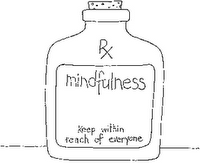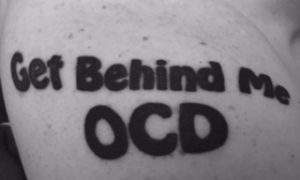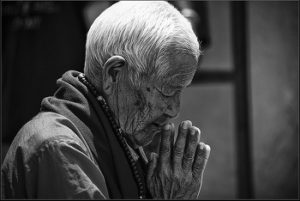
We have probably all heard the phrase: “laughter is the best medicine.” There is a lot of truth in this. Studies show that laughter reduces our stress response. When we laugh our muscles contract and this increases our oxygen and blood flow. We have probably all felt our bodies feel less tense after a good laugh. We release endorphins in our body when we laugh, and this can lead to feeling a relief, mentally and physically. Studies show that even when we force it, or use “fake laughter”, it has a positive effect on us. All of us might have done our share of this. 🙂 When dealing with OCD, or any other emotional struggle, it’s good to see that humor can be good medicine. When we feel as if our world is crashing down, often the last thing we may feel like doing is laughing or smiling. Kinda like the “diet and exercise” situation. We often know what good a healthy food choice and a trip to the gym can do for us. Knowing it and doing it are two different things. We may randomly hear, see, or think of something funny. This can be helpful for our overall mood and often happens to us on a regular basis. In the midst of an emotional struggle, unfortunately this can happen less and less. A common symptom of depression is anhedonia. Anhedonia is the loss of interest in pleasurable activities. What we usually find pleasurable or funny may not have the same effect on us when we are in the middle of an emotional storm. It doesn’t mean that this has left us permanently, they are more or less just put on hold. I bring this up so that we can try to be more mindful of what we enjoy and what has worked for us previously. By worked I mean, the people, places, books, movies, music, exercise, situations, etc, that have brought us joy. Being mindful of what we enjoy and value is important. It becomes our compass that can help direct us where we want to go. It seems like a simple concept, and it is. We see once again that we may have to “force” ourselves to be involved in what has worked in the past and to be open to what might work going forward, e.g- ERP, ACT therapy, etc. By paying attention in the moment, and tuning into what we enjoy, this can get us back on the path we want to travel. The C in ACT therapy stands for commitment. We become mindful of our situation and use acceptance of what we are experiencing. Then we commit to a direction we value, and this is great news. We don’t have to put our lives on hold any longer. Our lives will never be perfect or “just right” Whether that is our obsessions, our addictive behaviors, our bank accounts, our jobs, our weight, etc. Lets pick up our “stuff” and get busy living. In ACT therapy they ask: “what do you want to do with your time on this planet?” I have read this sentence over a hundred times and it still hits me like a ton of bricks. It’s powerful and its reality. We are only given so much time! Making a list of our interests can be helpful. Keeping this near or maybe in our phone is a good tool to have. Why would we need to know what we are interested in? That seems pretty basic, right? When the grasp and cycle of OCD, depression, or another struggle has us focused on the negative junk, a moment of “noticing” or mindfulness can help us bounce back on track. It can be as basic as following our breath then moving in a direction we value. It’s not always easy, but it’s basic and doable. Noticing that we are breathing, in and out, noticing what that literally feels like physically, this is an example of being mindful. There are countless ways to be mindful. Whether we are using a technique in Exposure and Response Prevention, Acceptance Commitment Therapy, or battling a destructive habit, pausing and checking in with our thoughts and actions can be very helpful. Obsessions, compulsions, impulsive behavior, anxiety, panic, the grip of depression, these can all can feel like a never ending train ride into darkness. The good news is that we can check in with our thoughts and actions, we can notice and not respond to them, just notice. We know that we can’t stop our thoughts but we CAN change how we respond to them. The main goal of OCD treatment is to stop the compulsions or rituals and to live in uncertainty. We might have very “dark” thoughts, our brain might tell us to perform rituals or compulsions to make it “okay.” Just noticing or looking at the thoughts or images, and letting them just be, will put us closer to freedom. By giving into the rituals, we continue to put fuel into that damn OCD train. We learn that purposely putting ourselves into scary situations, and not responding to the ridiculous demands of OCD, that this will then have less and less power over us. We can notice the train, but we don’t have to ride. Even if we are on the train, we can still notice these thoughts, images or impulses, they are going to be there reagrdless, but again, we don’t have to respond. ACT therapy suggests noticing our thoughts, using acceptance, and moving in a direction we value. A value is something we want to stand for in life. Being a “loving Mom” or being a “good listener”, these are examples of values. We try to “reach” goals. With values, we move towards them, we move in a direction what we care about. We try to reach goals, goals are measurable. “I want to lose ten pounds over the next 30 days” is a goal. We might value having more freedom from OCD. This value might look like participating in ERP. Another example of a value is: “spending time with my grandson.” An example of a goal is: “I will meet with my therapist weekly over the next month to participate in treatment.” And hopefully participating in OCD treatment would lead to less time spent on useless rituals and more time to “spend with my grandson.”
It’s cliche to say that we have to start somewhere, but it’s true. We obviously can only start from where we are now, the past is done. If we need some laughter, let’s lean into what makes us laugh. Let’s lean into what we enjoy, whether it’s healthy relationships, exercise, funny movies, etc. Lets “force” or commit ourselves to jump back into pleasurable situations or things that we enjoy. It’s so easy to get lost in this emotional sea of darkness and doubt. Checking in with ourselves and using reminders can help us get back on track. Being mindful and leaning into what we enjoy may be difficult at times, but it’s crucial for our emotional health if we have left this in the past. Let’s remember that we really don’t have overall health without our mental health.
We might lean into an exposure in OCD treatment. We might lean back into a relationship with a loved one that has fizzled out. We might lean into going to the movies with a friend, even though we don’t feel like it. We might find ourselves pleasantly surprised once we get there and the movie starts. We might be glad that we forced ourselves to go out. We might see that 15 minutes into a workout, “man, this feels good, I’m glad I went ahead and did this.” ACT therapy suggests taking all our “stuff” with us and moving in a direction we value. The obsessions, compulsions, thoughts, impulses, sadness, etc, can all come along for the ride, they are probably going to be with us anyway. As hard as that can seem to swallow, that’s okay, one moment at a time. Once again, we can notice the negative stuff and then go about our day, we can let that junk float into the background. We don’t have to give into the demands. “I see you, OCD. Thanks for checking in, but I’m going out with friends anyway.” The less we give the OCD bully what it wants the less we will hear from him. OCD will split hairs and over analyze and “what if’ a situation to death! Whether it’s OCD, depression, or some other emotional struggle, let’s notice that it’s there, try to accept it, and then do our best to go enjoy our lives. It’s not easy, but it’s possible, it’s truly possible. Hang in there.
“If you think I’ll sit around while you chip away my brain, listen I ain’t foolin’ and you’d better think again.” – Rob Halford, Judas Priest, “You’ve Got Another Thing Comin'”











